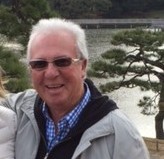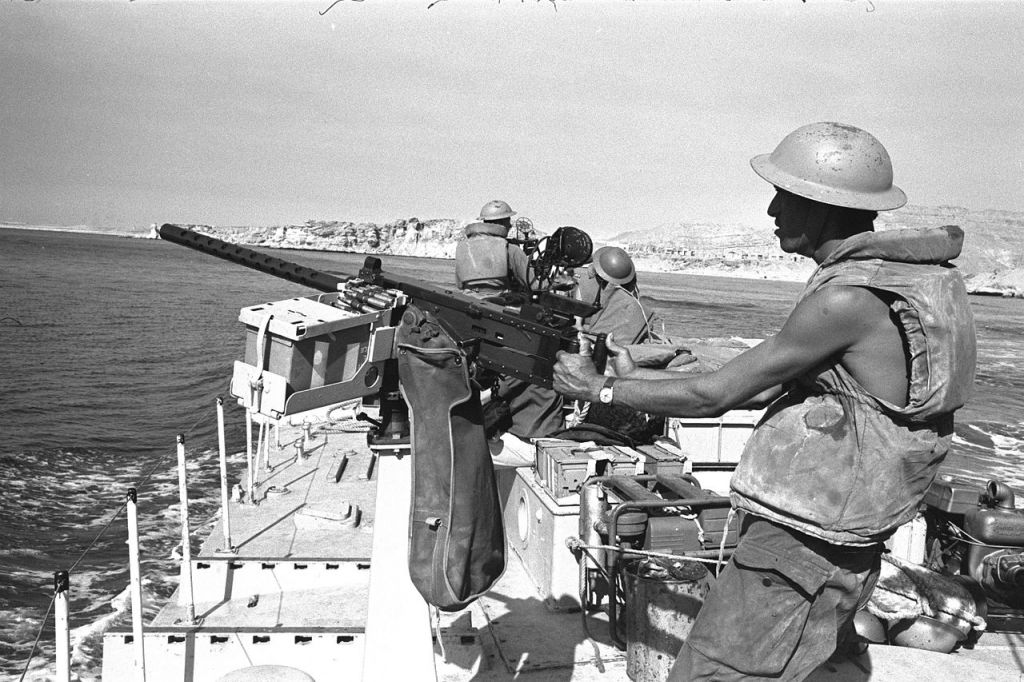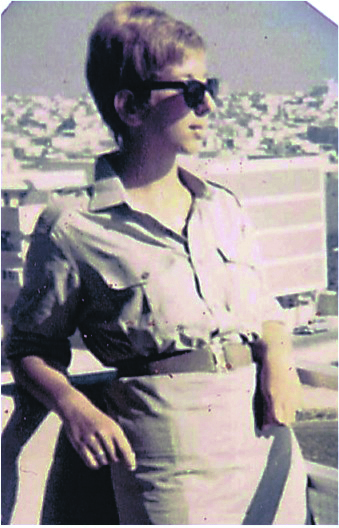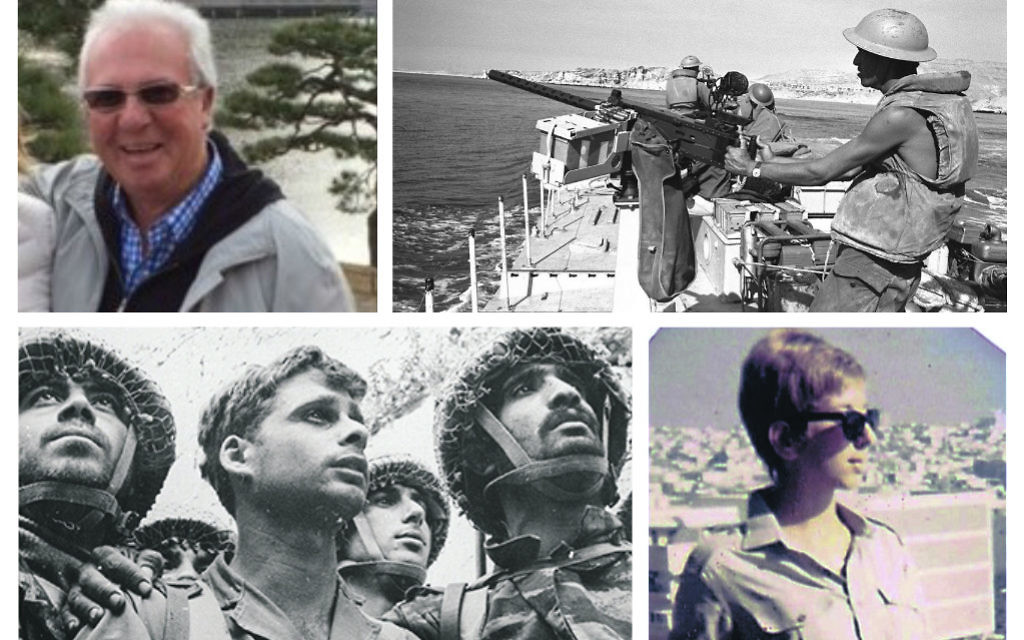The British Jews who defended Israel in 1967
Leon Symons speaks to three British Jews about their experiences after they left home 50 years ago to help with the battle against the Arab armies and the recovery effort after the conflict
A “Formula One” dash across the desert, dodging bullets by sheltering under a truck in the dunes, standing on the banks of the Suez Canal and guarding hundreds of prisoners – this was 21-year-old Tony Burnett’s Six-Day War.
Burnett (pictured, inset) came from Leeds.
Now 71 and a bankruptcy liquidator who has lived in Toronto, Canada, for 37 years, he recalled driving from Leeds to London to volunteer.
Get The Jewish News Daily Edition by email and never miss our top stories Free Sign Up
From there, he flew to Amsterdam and then on El Al to Israel.
“As we flew in to Lod, two Mirage jets appeared off the wings to escort us. That was my first thrill. It was absolutely amazing,” says Burnett, who is also a former amateur racing driver.
 He believes he was among the first volunteers to enter the country.
He believes he was among the first volunteers to enter the country.
Once on the ground, he and others were moved away from Tel Aviv to a base in Beersheba.
“They gave us the option of going on a kibbutz to fill the void of those who had gone to fight or we could join the army. I didn’t know about going to a kibbutz – my intention was to join the army to fight,” he said.
On his first day, he was given a uniform.
“It was awful; too big and too baggy, trousers up to our belly buttons and hats falling over our heads,” he said. His patrol leader, Yavi, took the group to his mother’s home in Beersheba, where she altered the kit to fit properly. “Now we felt like real soldiers,” Burnett says.
Training started the next day. They were given a Swedish-made weapon used by the Arabs. “It was the worst gun you could imagine – which is why they showed it to us. Then they gave us an Uzi. You could see the difference immediately and how superior it was.”
Burnett and his co-volunteers were told they would be driving trucks loaded with troops, ammunition, food and water.
“I remember when it started. The heavy armour, tanks, half-tracks and other vehicles, was already on the border with Egypt,” he says.
“We drove to the Gaza border and parked for 12 to 14 hours. Then came the words: ‘It’s started, we’re going.’ It was like a Formula One race, with the tanks and half-tracks going first, then troops, and we were about 15 minutes behind.
“We drove in convoy into the Sinai and that’s when we skirmished with pockets of Egyptian troops. They shot at anything that moved, including us. There was nowhere to shelter except under or behind your vehicle.”
Later, Burnett says “we found out the Egyptian soldiers ran because they weren’t soldiers; they were farmers who had been conscripted, not a trained army”.

The dash across the desert continued with the aim of reaching the Suez Canal. “Along the way, we passed an Egyptian rocket base and all the missiles were pointed towards Israel. We went past it about five weeks later and they were all pointing towards Egypt.”
After another firefight at the Suez Canal, the convoy turned south and headed for the Mitla Pass. “There was carnage – mile upon mile of wreckage of Egyptian heavy equipment,” Burnett says. “This was the work of the Israeli air force.”
Once the war was won, Burnett and his unit were sent to guard prisoners.
“People call it the six-day war. But all during the time we were guarding the prisoners, we could hear gunfire around us and sometimes quite close. There were still pockets of resistance, Egyptian troops who were hiding and found by Israeli soldiers.
“We were there because we were passionate about Israel. One Arab leader said they were going to push the Israelis into the Mediterranean. Those words got to me more than anything. I said ‘not in my life’.”
By the time Frank Rosenhead arrived in Israel, the six days of the war were over, but there was still much to do, including a stint on the captured Golan Heights. “The whole area had been abandoned,” he recalls. “The entire Golan was one military camp. It seemed its entire existence was to help destroy Israel.
“I didn’t see any scary stuff like weapons. But I collected about a dozen magazines which I wish I had kept. They contained images of the traditional white Arab stallion being ridden by an Arab in long, flowing garb and using his scimitar to cut up a hunchbacked, hook-nosed insect-like figure living along the coast.
“You can guess who that was. These books looked like they were used to teach conscripts to read. Now I wish I had kept them.”
Rosenhead admits he was not a Zionist but was caught up in the fervour that accompanied the Arab assault on Israel and the desired intention to eradicate the Jewish state.
He arrived in July and was assigned to a military base in Atlit, south of Haifa, where he worked in a warehouse stacking shelves with returned or captured military equipment.
“A lot of people were issued with gas masks because many people, including soldiers and reservists, were very nervous about the idea of a gas attack, which we know was threatened many years later,” he says. “I had to put hundreds of boxes of gas masks back on the shelves.
“We were doing what we set out to do –
anything that would help – and we did anything that was asked of us, whether it was scrubbing floors or cleaning toilets.
“Things generally were pretty much normal. The thing that resonated with me the most was the incessant playing of Yerushalayim Shel Zahav (Jerusalem the Golden). ”

Volunteers were given families to visit for Shabbat, so Rosenhead began to meet ordinary Israelis and share their reactions. “There was excitement and relief from the tension they felt when they were threatened,” he says. “And of course the excitement engendered of being able to go to the Wall.”
Rosenhead stayed for 13 months and has maintained connections with Israel ever since. His son lives there with his wife and three grandchildren, so Rosenhead is a regular visitor.
Judy Miller, magazine editor of the Jewish Deaf Association, was a 21-year-old fledgling journalist in 1967 when she turned her back on London to volunteer to go to Israel.
“One day in the far future, someone digging in the Hendon area may come across a glass pickle jar containing two empty Russian cartridge cases,” she says. “ I picked them up from the scorched earth in Syria littered with bullets, in a place called Quneitra, on the Golan Heights. They were empty, but I kept them as a souvenir of my five months in Israel.”
Miller had never been to Israel, yet joined a queue of hundreds of Jewish volunteers outside the Jewish Agency at Rex House in Regent Street. “We were told the oranges had been picked by volunteers who arrived before the Brits and that wounded soldiers were being treated by the many teams of doctors and medical staff. And all the kibbutzim were completely full,” she recalls.

Israeli soldiers said they wanted to send her and other volunteers from around the world to Sinai to work on an army camp in the desert called Jebalibne. “We were all shocked and the Londoners refused – except for my girlfriend Delphine and me,” Miller says. “However, a small group of gigantic young Australians arrived at our centre, so they were sent to Sinai and the lily-livered Londoners were packed off to a huge old army camp near Haifa.”
This was Machane Tira, the main supply camp for northern Israel. “It was packed with captured tanks and other equipment,” Miller says.
“Our job was to stand in a stiflingly hot warehouse, crawling with cockroaches and mosquitoes, for about seven hours a day to pack and store captured Syrian army uniforms that had arrived from the laundry. I thought I would die of boredom and heatstroke. We were then made to study Ivrit every afternoon for four hours – I don’t know how I kept awake.”

After about three months, Miller joined volunteers bound for Quneitra. “The Syrian residents ran away when the Israeli army invaded on 10 June, the last day of the war, so all the houses and buildings were empty.
I went into a few of the houses. There was still washing left in their washing machines, which I found very sad.”
She and her fellow volunteers had to clear out a deserted Syrian army camp and load the captured equipment on to trucks to take back to Israel, but life, she says, was not ideal. “We were boarded in a former Arab schoolhouse; we slept in our sleeping bags on hard desks in the old classrooms. It was baking hot and mosquitoes swarmed around us.”
Back in London after five months, she returned to her job with Drapers Record, the fashion industry “bible”, where she was promoted to the job of assistant fashion editor. She has since visited Israel many times on holiday and for work.

Thank you for helping to make Jewish News the leading source of news and opinion for the UK Jewish community. Today we're asking for your invaluable help to continue putting our community first in everything we do.
For as little as £5 a month you can help sustain the vital work we do in celebrating and standing up for Jewish life in Britain.
Jewish News holds our community together and keeps us connected. Like a synagogue, it’s where people turn to feel part of something bigger. It also proudly shows the rest of Britain the vibrancy and rich culture of modern Jewish life.
You can make a quick and easy one-off or monthly contribution of £5, £10, £20 or any other sum you’re comfortable with.
100% of your donation will help us continue celebrating our community, in all its dynamic diversity...
Engaging
Being a community platform means so much more than producing a newspaper and website. One of our proudest roles is media partnering with our invaluable charities to amplify the outstanding work they do to help us all.
Celebrating
There’s no shortage of oys in the world but Jewish News takes every opportunity to celebrate the joys too, through projects like Night of Heroes, 40 Under 40 and other compelling countdowns that make the community kvell with pride.
Pioneering
In the first collaboration between media outlets from different faiths, Jewish News worked with British Muslim TV and Church Times to produce a list of young activists leading the way on interfaith understanding.
Campaigning
Royal Mail issued a stamp honouring Holocaust hero Sir Nicholas Winton after a Jewish News campaign attracted more than 100,000 backers. Jewish Newsalso produces special editions of the paper highlighting pressing issues including mental health and Holocaust remembrance.
Easy access
In an age when news is readily accessible, Jewish News provides high-quality content free online and offline, removing any financial barriers to connecting people.
Voice of our community to wider society
The Jewish News team regularly appears on TV, radio and on the pages of the national press to comment on stories about the Jewish community. Easy access to the paper on the streets of London also means Jewish News provides an invaluable window into the community for the country at large.
We hope you agree all this is worth preserving.
-
By Laurent Vaughan - Senior Associate (Bishop & Sewell Solicitors)
-
By Laurent Vaughan - Senior Associate (Bishop & Sewell Solicitors)
-
By Laurent Vaughan - Senior Associate (Bishop & Sewell Solicitors)
-
By Laurent Vaughan - Senior Associate (Bishop & Sewell Solicitors)






















